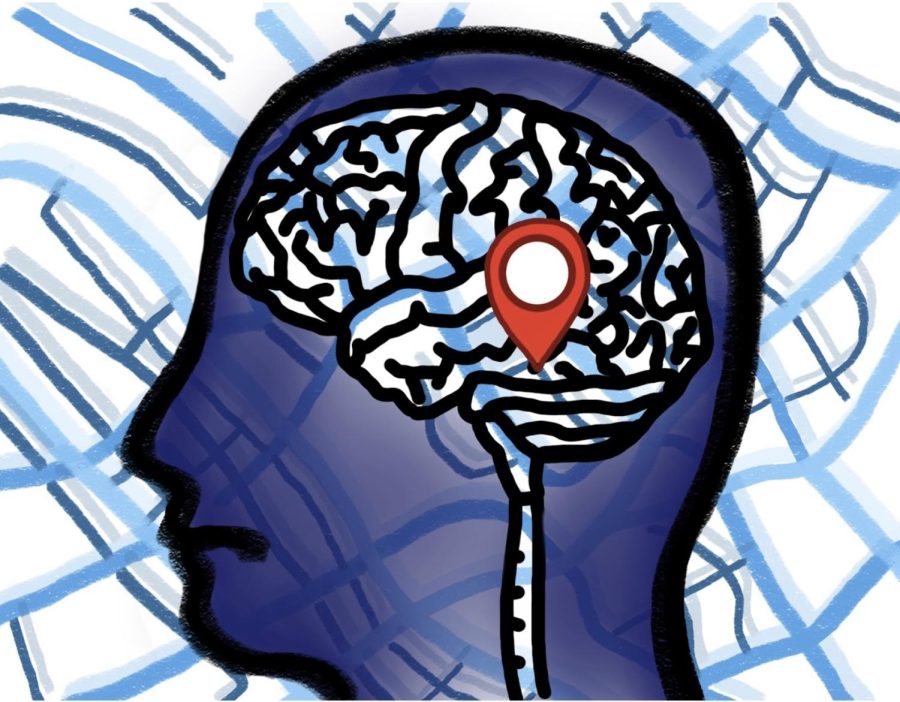Road to madness: Truth behind dangerous effects of GPS
GPS is a technological device used daily to help navigate, though its usage can affect the brain’s perception and performance. The Sidekick staff writer Divya Sivalenka explores the changing behaviors of the brain due to these devices.
February 8, 2023
The weekend is here, and you are ready to jump in your car and go on a long road trip with your friends. Can you imagine driving somewhere new without Google Maps directing you from your cellular device?
The prevalence of Global Positioning System (GPS) navigation devices and applications has become increasingly popular over the last 15 years and people now rarely travel without them. They provide users with positioning, navigation and timing services (PNT) services, which contributes to improved safety and productivity.
GPS is a gadget with outstanding technological abilities. Coppell High School sophomore Sai Kasiraman argues that the navigational technology of GPS is too advanced to ignore.
“GPS is indeed very helpful,” Kasiraman said. “The pathfinding capabilities of most map softwares today are extremely indispensable, especially when trying to go to new places without any navigational technology.”
These devices have revolutionized the way people navigate, but have also brought with them a number of negative effects that cannot be ignored. The over-reliance on GPS has led to a decline in traditional navigation skills such as map reading and spatial awareness.
In a study published by Scientific Reports in 2017, writers Louisa Dahmani and Veronique Bohbot discuss their findings regarding the negative impact of persistent GPS use on spatial memory, especially during self-guided navigation. Spatial memory refers to the mental process that makes it possible for us to both recall various locations and the spatial relationships between various objects.
The authors of the study argue that the overdependence on GPS can lead to a decline in our ability to store and recall spatial information, which can impact our capability to navigate unfamiliar environments.
The study was conducted by having the subjects navigate a virtual environment using either a GPS system or their own memory while monitoring their brain activity, specifically their hippocampus, which is a structure in the brain embedded deep into the temporal lobe. It functions as a learning and memory center for the body, which helped us navigate the world before the invention of GPS.
The results showed that participants who navigated using GPS performed significantly worse than those who used their own memory. Our spatial memory is a critical component of our ability to navigate and find our way in the world and a decline in this ability could have negative consequences for our independence and mobility. Furthermore, it could also have implications for our ability to perform tasks that require spatial awareness, such as reading maps, playing sports or finding our way around a new city.
Another problem GPS poses is the significant negative impact on environmental learning. A study conducted by ScienceDirect revealed GPS’s effect on spatial transformation, which is the ability to mentally manipulate and orient objects in space. GPS has reduced the need for people to develop this skill, as they can simply rely on technology to tell them where to go and what to do.
Furthermore, frequent GPS use can also lead to a reduction in the development of environmental knowledge as GPS does not provide contextual information about a person’s surroundings, such as local landmarks, historical significance or environmental features. This lack of context means people are missing out on important environmental information that would help them better understand and appreciate their surroundings.
In an article published by The Washington Post, “Ditch the GPS. It’s ruining your brain,” M.R. O’Connor writes about the decline in people’s ability to mentally map their surroundings and recall directions. O’Connor urges the readers to “ditch” navigational devices by explaining other reasons outside of neuroscience.
“Finding our own way – using perception, empirical observation and problem-solving skills – forces us to attune ourselves to the world,” O’Connor said. “We can nourish ‘topophilia,’ a sense of attachment and love for a place. You’ll never get that from waiting for a satellite to tell you how to find a shortcut.”
CHS sophomore Anish Konda further supports his sentiment by talking about the one-dimensional limitations of using GPS.
“[GPS] is not allowing us to understand our surroundings and see the world for what it is,” Konda said. “You’re stuck in one screen and don’t actually take the time to see what’s around.”
However, there is also the case where we as a society could be overreacting to modern technology. Kasiraman suggests the public tends to demonize the idea of relying upon gadgets for our daily lives.
“People assume that the technological era is something to be feared because we are slowly developing a reliance on gadgets,” Kasiraman said. “It’s not necessarily a bad thing either because technology allows us to remain current and helps us do things faster.”
Whatever the implications of GPS may be, it is important to be aware of its potential impact on our spatial memory and to use it in moderation. By incorporating other navigational techniques, such as mental mapping or reading a map, we can help maintain our spatial memory abilities and remain independent and confident navigators.
Follow Divya (@DivyaSivalenka) and @CHSCampusNews on Twitter










